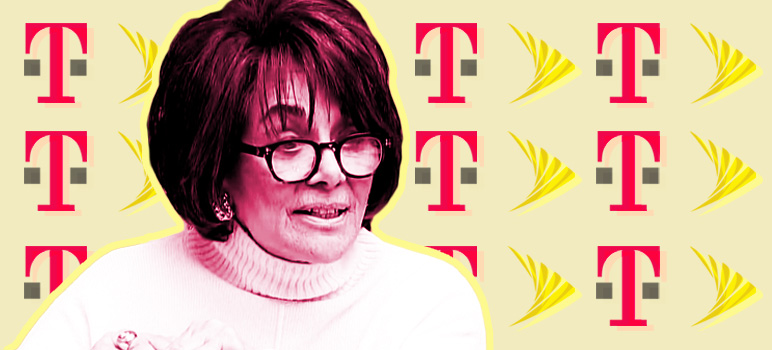Silicon Valley Congresswoman Anna Eshoo, like many fellow Democrats, has duked it out before with high-tech and telecom giants over privacy, net neutrality and anti-competitive corporate takeovers. But when the veteran lawmaker had a chance recently to grill executives over the planned T-Mobile-Sprint merger, she positioned herself firmly in their corner by urging regulators to bless the hugely controversial $26.5 billion tie-up.
While Congress has no power to rule on the merger, elected representatives can question experts and industry officials and raise concerns to the FCC. Eshoo simply chose not to.
Instead of using her allotted five minutes at a Feb. 13 House Energy and Commerce Committee hearing to probe the deal, Eshoo echoed some of the same industry talking points that came up in a letter she co-signed a few weeks prior with six Republicans and as many centrist Dems. Eshoo argued that shrinking the market from four to three major wireless carriers would incentivize 5G rollout and somehow boost competition (a claim belied by a half-century of telecom history, but sure).
Democrats, Eshoo included, have historically taken a more skeptical view of such mergers, including in 2014 when a Dem-led FCC blocked T-Mobile’s first attempted union with Sprint. A few years before that, Barack Obama‘s DOJ sued to block AT&T’s proposed T-Mobile acquisition; Eshoo applauded the move, saying it reflected her views on the need for “true competition.”
But her logic today seems to be: Why fight it? Or, rather, to fight duopoly with duopoly.
“Capitalism doesn’t work without competition,” she explained from the dais. “And when markets don’t work, consumers are the first to lose. Competition is the lifeblood of the economy. It stimulates innovation—something that my district produces a great deal of—and it benefits consumers with more choices, lower prices and better service.”
Funny she’d invoke her home turf’s famed high-tech industry in an argument for mega-mergers, considering Joint Venture Silicon Valley released a report that same week which noted how consolidation has made the region inhospitable for startups.
It’s hard to imagine Eshoo buying her own rationalization. Maybe those $572,000 in career donations from Big Telecom made it easier to suspend scrutiny.


Meanwhile, seven Democratic senators (four of whom have announced their candidacies for president in 2020) and independent senator Bernie Sanders have jointly sent letters to the FCC and the Justice Department, that also has jurisdiction in merger cases, urging them to reject the proposed merger. In their letter, the Senators argue that the merger would be a “sharp blow to competition in the telecommunications industry” and would “eliminate competition that has been shown to benefit consumers and stifle the emergence of new carriers” (see https://thehill.com/policy/technology/429618-dem-senators-urge-fcc-justice-department-to-reject-t-mobile-sprint-merger and https://thehill.com/policy/technology/428619-t-mobile-sprint-step-up-merger-push). Eshoo’s position in this can be best explained by the $572,000 plus in career contributions from the telecommunications corporations. (This parallels her even more fervant work in protecting the pricing power of drug companies who have made her the fourth biggest career recipient of drug company contributions after Barack Obama, Hillary Clinton and Orin Hatch. See https://www.sanjoseinside.com/2019/01/10/op-ed-rep-anna-eshoo-needs-to-answer-for-ties-to-big-pharma/)